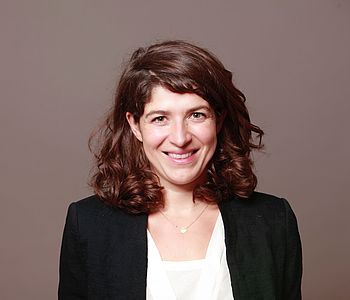Dr. Maria Ketzmerick | Assoziierte Forscherin
Ehemaliges Mitglied
Mutterinstitut
:
Zentrum für Konfliktforschung, Philipps Universität Marburg
|
Position
:
Wissenschaftliche Mitarbeiterin
|
Fachbereich
:
Politikwissenschaft
|
Biographie
Maria Ketzmerick arbeitet als wissenschaftliche Mitarbeiterin am Zentrum für Konfliktforschung an der Philipps-Universität Marburg. Dort hat sie im Sonderforschungsbereich »Dynamiken der Sicherheit« zu postkolonialen Sicherheitskonstruktionen im kamerunischen Dekolonisierungskrieg promoviert. Zuvor hat sie an den Universitäten WWU Münster, IEP Lyon, Leipzig und Roskilde Politik- und Rechtswissenschaften mit einem Schwerpunkt auf Internationale Beziehungen und Regionalstudien studiert. Ihre Forschungsschwerpunkte liegen im Bereich der Dynamiken in der kritischen Sicherheitsforschung, postkolonialen Theorien und Prozessen der Dekolonisierung (insbesondere im französischen Kolonialismus), Statebuilding und Peacebuilding, der Region Zentralafrika sowie Archivforschung in den Internationalen Beziehungen.
Forschungsthema
Dynamiken um Ver- und Entsicherheitlichung sowie Critical Security Studies
Global Studies Ansätze, postkoloniale Theorien und Prozesse der Dekolonialisierung (insbesondere französischer Kolonialismus)
Statebuilding in Kamerun
Feministische Ansätze der internationalen Beziehungen und Geschlechterverhältnisse
Titel der Dissertation
Staat, Sicherheit und Gewalt in Kamerun: Postkoloniale Perspektiven auf den Dekolonisierungsprozess unter französischer UN-Treuhandverwaltung.
Institution der Dissertation
Betreuer
Reunification as Statebuilding in a Global Perspective: The Resilience of the Transition Processes in Cameroon and Germany
Abstract
In this project I aim at understanding why the reunifications in Cameroon and Germany unfolded long term conflicts and violence. I analyze on a local scale why identity anchored with a specific memory architecture that even strengthened over time. On a global scale, I investigate why the international system favoured these processes over other alternatives especially since both reunification happened in a specific time in international history and provided the basis for a normative change within the international system. In that sense I contribute theoretically to knowledge on differing understandings of statehood, legitimacy, and secessionism and reunifications in international relations and law, and how the transformatory processes have been executed on the ground in the arenas of bureaucracy, rule of law, and society. For that purpose, I use quantitative text analysis methods for archival documents and data gathered from group discussions and interviews in the field. Empirically, I bring together two cases that were never analyzed in comparative perspective. This unique case design helps to analyze the alternativelessness of these regime transitions that led to the ongoing conflicts in both cases and, furthermore, contextualize current reunification efforts as in North Corea. Theoretically, researching reunifications supports an understanding of the long term effects and consequences of international engagement in statebuilding and investigates the ambiguity of international law, thus provide the basis for the reassessment of the state and its role in a changing international order.
Publikationen
Monographie und Herausgeberschaft:
2019. Staat, Sicherheit und Gewalt in Kamerun. Postkoloniale Perspektiven auf den Dekolonisierungsprozess unter französischer UN-Treuhandverwaltung. Bielefeld: Transcript.
2017. Securitization in Statebuilding and Intervention. Baden-Baden: Nomos. (Herausgegeben mit Thorsten Bonacker und Werner Distler)
Zeitschriftenartikel:
2019. “Securitized State Building? – The Camerounian Decolonization in Conflict”. In: “Conceptualizing Power in Dynamics of Securitization: Beyond State and International System.” Regina Kreide und Andreas Langenohl (Hrsg.). Baden-Baden: Nomos.
2018. “Securitization and Desecuritization of Violence in Trusteeship Statebuilding“ (zusammen mit Thorsten Bonacker und Werner Distler). In: Civil Wars, Issue 3. Doi: https://doi.org/10.1080/13698249.2018.1525675 .
2017. "The ‘Politics of Protection’ and Elections in Trusteeship and International Administration. The Cases of Cameroun and Kosovo" (zusammen mit Werner Distler). In: Securitization in Statebuilding and Intervention. Baden-Baden: Nomos (2017)
2017. "How Security Dynamics Shaped Trusteeship Statebuilding: The French Administration of Cameroon" (zusammen mit Thorsten Bonacker). In: Securitization in Statebuilding and Intervention. Baden-Baden: Nomos (2017)
Blogartikel:
2019. „Postkoloniale Außenpolitik: Wie sich Deutschland in Kamerun engagieren sollte“. Peacelab Blog. Verfügbar unter: https://peacelab.blog/2019/05/postkoloniale-aussenpolitik-wie-sich-deutschland-in-kamerun-engagieren-sollte